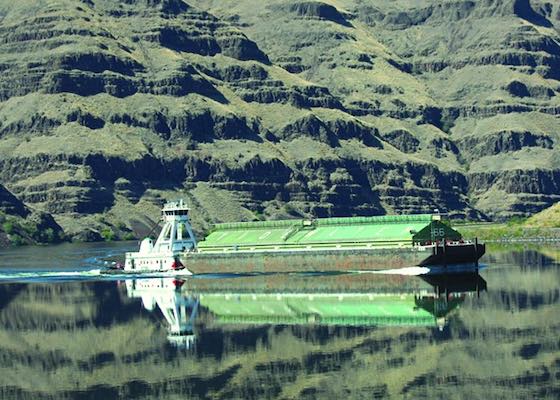forum
library
tutorial
contact

No One Wants to be Labeled
an Un-woke "Salmon Racist"
by Stephen Hartgen
Statesman Journal, March 29, 2020
|
the film forum library tutorial contact |

|
No One Wants to be Labeled
by Stephen Hartgen
|
Nor do breach advocates cite the fact that 80% of returning salmon
are already hatchery-raised, not "wild" returnees.
 Dam removal on the lower Snake River below Lewiston is once again in the news, with so-called "experts" like river enthusiasts, journalists and columnist Jim Jones all jumping in feet first to support breaching.
Dam removal on the lower Snake River below Lewiston is once again in the news, with so-called "experts" like river enthusiasts, journalists and columnist Jim Jones all jumping in feet first to support breaching.
But it's mostly speculation. There's little evidence dam breaching would actually restore salmon runs. Indeed, factors like changing ocean temperature and fish migration patterns, ocean predators like orcas and seals, as well as Indian tribal net takings, are huge factors in the salmon's declines.
But these aren't on the dam-breachers' radar, who've now taken to citing arm-chair journalists as their "authorities" for the pro-breaching argument.
Former Supreme Court Justice Jim Jones, (Idahopoliticsweekly, Jan. 20), cites an article by hook-line-and-breacher Rocky Barker, a retired Idaho Statesman reporter, on how the only solution to saving the salmon is to breach the lower Snake dams.
Journoes rarely know, much less report on, the full range of discussion on any topic. That's why they're journoes after all, often with preferred agendas. They do this on many topics, from politics to environmental issues, to sociology, to history, so why not just leave out the "rest of the story" on salmon recovery?
Dam-breach advocates ought to know better, including those who grew up in Southern Idaho, on an irrigated farm made possible only due to agricultural water use and storage.
Neither Jones nor Barker gives so much as a seal flipper to the economic devastation dam breaching would have. Jones cites a figure of $17 billion spent so far ($17 billion!) on salmon recovery and seems to acknowledge that it's been pretty much wasted money.
Most of this has gone into tribal pockets, so-called "habitat improvements" and reams of studies, but with almost no gain in actual recovery. So they now throws the fish, rods and reels back into the river, saying nothing but dam breaching will work. Not shown by the evidence. No "Which Was To Be Proved," as lawyers say.
A little research would maybe modify this anti-agriculture view. A new study by University of Washington shows that killer whales, known as orcas, prefer larger salmon as food, thus reducing the returning numbers dramatically. (U of Washington, Dec., 2019). Sea lions (Once themselves considered "endangered.") prey on salmon along the lower Columbia and devastate returning salmon stocks (Washington Dept. of Fish & Wildlife, June, 2019).
And tribal fishing, both by dip nets and gill nets, is immune from politically-correct mention, much less seriously discussed by dam-breach advocates. (In another example of lefty virtue-signaling, notice how journoes never, ever scrutinize a protected/privileged minority group. Must be they're afraid of being woked out as "salmon racists.")
This goes on regularly as "tribal" fishermen routinely sell salmon out of the backs of their pickup trucks along riverside highways, often at "scale down" prices to tourists and costal-city yuppies. Doesn't look like species preservation, which the tribes claim is their motive.
Nor do breach advocates cite the fact that 80 percent of returning salmon are already hatchery-raised, not "wild" returnees. (US Fish & Wildlife Service, 2/28/16.)
So, what would be the price of breaching? Dam breaching would cost the nation over $2.3 billion, says a new study and would negatively affect the environment by adding to trucking rail and storage costs, as well as threatening thousands of acres of Idaho farmland. A recent study says about 14 million tons of Northwest wheat, destined for Asian markets, is barged through the Snake/Columbia system annually; it would take some 35,000 additional railroad cars (350 trains of 100 cars each) or 135,000 trucks to move the barged products.
Nor would breaching definitively increase salmon numbers; even the most ardent salmon advocates don't make promises as to the likely recovery numbers. They just say that everything else has been tried. It's like saying prison doesn't rehabilitate criminals, so let's just let ‘em all out.
Moreover, breaching would also deprive the region of consistent power generation, and would surely increase costs for millions of Northwest homes and businesses. (FCS Group, Jan. 2020.) Nor do they even mention the issue of flood control; it wasn't many decades ago when Western water basins routinely inundated farmlands and communities across the region.
The dams' power generation lights close to a million Northwest area homes, and the transportation costs of truck/rail would increase pollutant emissions by 1.3 million tons a year, as well as increase farmer storage and transportation costs by 50-100 percent, likely bankrupting numerous farms in the region, the study found.
A draft Environmental Impact Statement published in February reached the same conclusion, that dam-breaching would not likely solve the salmon issue and would have widespread negative impacts on the region's power generation, flood control and overall economy. (US Army Corps of Engineers, draft EIS, Feb. 28.)
But these likely impacts of dam-breaching are ignored in the narrative that nothing is left but breach-breach-breach. Rather than relying on biased opinions by pseudo-experts and biased journalists, dam-breach advocates should show more balance and skepticism.
Dam breaching isn't going to happen, not now and probably never. Maybe that's what's got dam-breachers so riled up, but that's the real world. Still, you know a scale has been scraped when prominent writers cite arm-chair reporters as sources and ignores pertinent and readily-available real numbers.
Related Pages:
Setting the Record Straight on Lower Snake River Dams by John W. Sigler, Statesman Journal, 4/9/20
learn more on topics covered in the film
see the video
read the script
learn the songs
discussion forum
